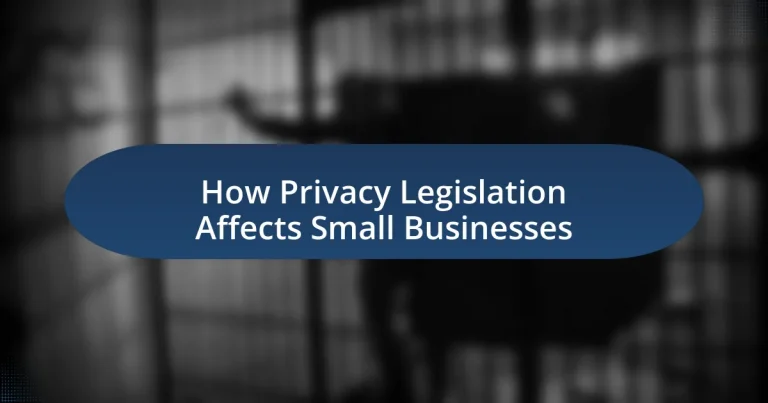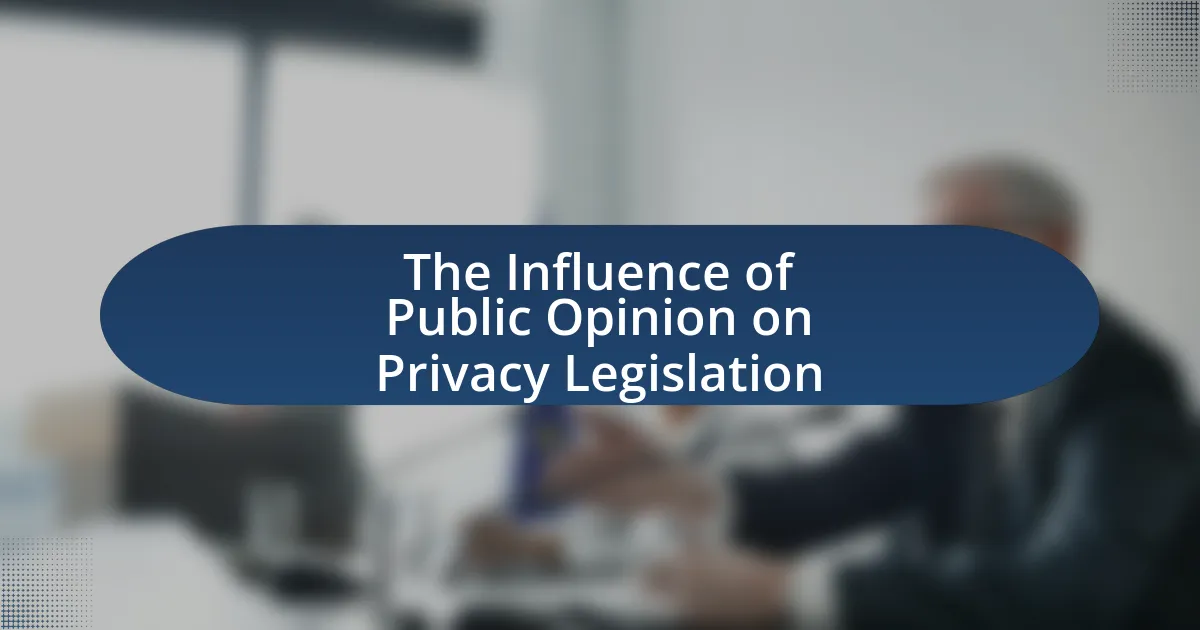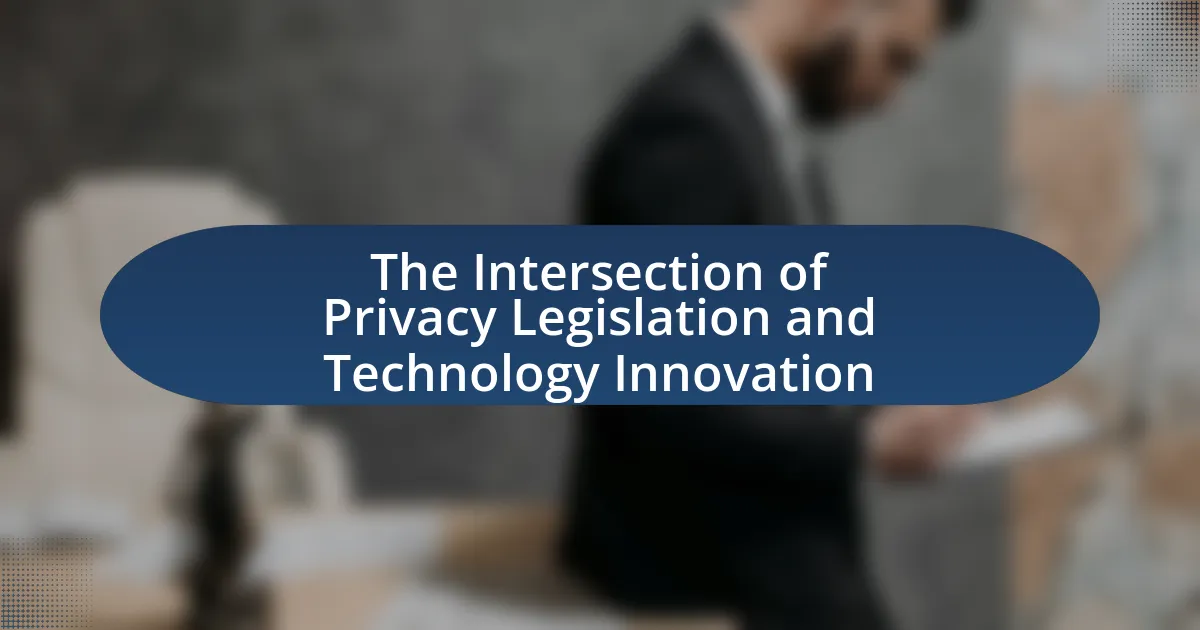Privacy legislation significantly impacts small businesses by imposing compliance requirements that strain their resources, necessitating investments in data protection, employee training, and legal consultations. Key components of these laws include data protection mandates, consent protocols, and data breach notification obligations, which vary across regions and can lead to substantial penalties for non-compliance. The article explores the types of data covered under privacy laws, the challenges small businesses face in adhering to these regulations, and the strategies they can implement for effective compliance. Additionally, it highlights the importance of compliance in building customer trust and loyalty, as well as the emerging trends in privacy legislation that small businesses should monitor to ensure ongoing adherence and operational integrity.
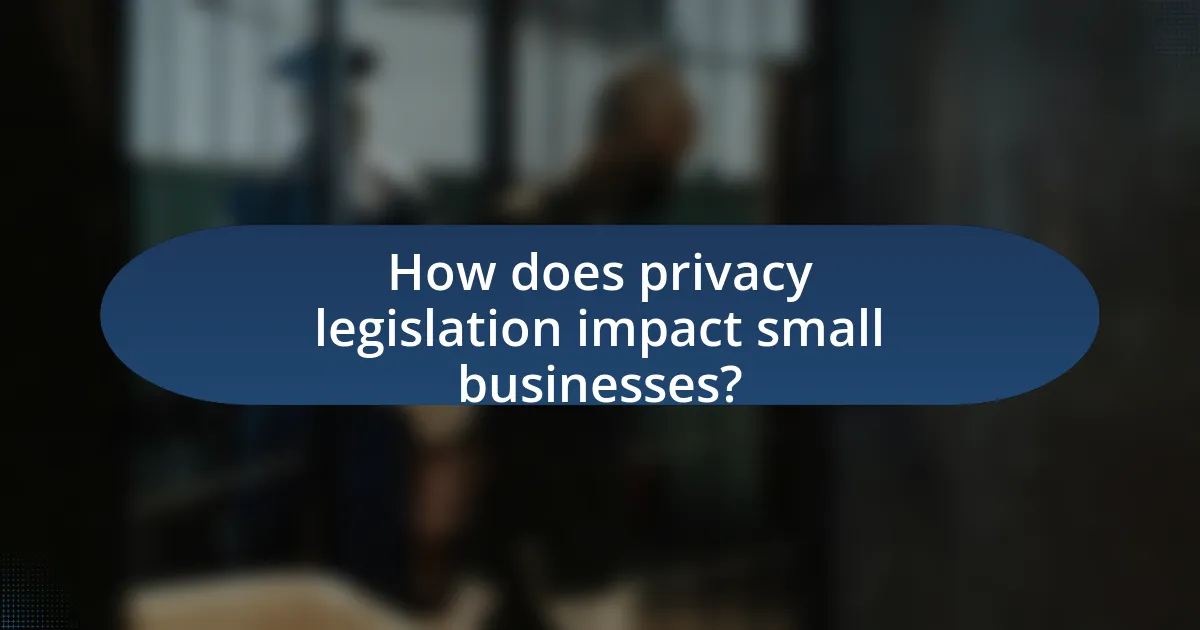
How does privacy legislation impact small businesses?
Privacy legislation significantly impacts small businesses by imposing compliance requirements that can strain their resources. Small businesses must invest in data protection measures, employee training, and legal consultations to adhere to regulations such as the General Data Protection Regulation (GDPR) or the California Consumer Privacy Act (CCPA). For instance, a survey by the National Small Business Association found that 43% of small businesses reported spending more than $5,000 annually to comply with privacy laws. This financial burden can divert funds from growth initiatives and operational improvements, ultimately affecting their competitiveness in the market.
What are the key components of privacy legislation affecting small businesses?
The key components of privacy legislation affecting small businesses include data protection requirements, consent protocols, data breach notification obligations, and rights of individuals regarding their personal information. Data protection requirements mandate that small businesses implement measures to safeguard personal data, ensuring its confidentiality and integrity. Consent protocols require businesses to obtain explicit permission from individuals before collecting or processing their personal data. Data breach notification obligations compel small businesses to inform affected individuals and relevant authorities promptly in the event of a data breach. Lastly, rights of individuals, such as the right to access, rectify, or delete their personal information, empower consumers and impose additional responsibilities on small businesses to comply with these requests. These components are often outlined in regulations like the General Data Protection Regulation (GDPR) in Europe and the California Consumer Privacy Act (CCPA) in the United States, which set specific standards for data handling and privacy practices.
What types of data are covered under privacy legislation?
Privacy legislation typically covers personal data, which includes any information that can identify an individual, such as names, addresses, email addresses, phone numbers, and social security numbers. Additionally, sensitive data types like financial information, health records, and biometric data are also included under privacy laws. For instance, the General Data Protection Regulation (GDPR) in the European Union explicitly defines personal data as any data related to an identified or identifiable natural person, reinforcing the importance of protecting such information.
How do different privacy laws vary across regions?
Different privacy laws vary across regions primarily in their scope, enforcement mechanisms, and specific requirements for data protection. For instance, the General Data Protection Regulation (GDPR) in the European Union mandates strict consent requirements and gives individuals extensive rights over their personal data, while the California Consumer Privacy Act (CCPA) focuses on transparency and consumer rights but has less stringent consent requirements. Additionally, countries like Brazil have enacted the Lei Geral de Proteção de Dados (LGPD), which shares similarities with the GDPR but includes unique provisions tailored to Brazilian contexts. These variations impact small businesses differently; for example, compliance costs and operational adjustments can be significantly higher in regions with stringent laws like the EU compared to those with more lenient regulations.
Why is compliance with privacy legislation crucial for small businesses?
Compliance with privacy legislation is crucial for small businesses because it helps protect customer data and builds trust. When small businesses adhere to laws such as the General Data Protection Regulation (GDPR) or the California Consumer Privacy Act (CCPA), they mitigate the risk of data breaches and the associated financial penalties, which can be devastating for their operations. For instance, non-compliance with GDPR can result in fines up to 4% of annual global revenue or €20 million, whichever is greater. Additionally, demonstrating compliance can enhance a small business’s reputation, leading to increased customer loyalty and competitive advantage in the market.
What are the potential penalties for non-compliance?
Potential penalties for non-compliance with privacy legislation can include substantial fines, legal action, and reputational damage. For instance, under the General Data Protection Regulation (GDPR), organizations can face fines of up to 4% of their annual global turnover or €20 million, whichever is higher. Additionally, non-compliance may lead to lawsuits from affected individuals or regulatory bodies, further exacerbating financial and operational challenges for small businesses. These penalties underscore the importance of adhering to privacy laws to mitigate risks and protect business interests.
How can compliance enhance customer trust and loyalty?
Compliance enhances customer trust and loyalty by demonstrating a business’s commitment to ethical practices and data protection. When a company adheres to privacy legislation, it assures customers that their personal information is handled responsibly and securely. For instance, a study by the Ponemon Institute found that 70% of consumers are more likely to trust companies that comply with data protection regulations. This trust translates into increased customer loyalty, as consumers prefer to engage with businesses that prioritize their privacy and security.
What challenges do small businesses face in adhering to privacy legislation?
Small businesses face significant challenges in adhering to privacy legislation, primarily due to limited resources and expertise. Many small enterprises lack the financial capacity to hire dedicated compliance staff or invest in comprehensive data protection systems, which are essential for meeting legal requirements. According to a 2021 survey by the National Small Business Association, 60% of small businesses reported that compliance with privacy laws is a major concern, often citing the complexity of regulations like the General Data Protection Regulation (GDPR) and the California Consumer Privacy Act (CCPA) as overwhelming. Additionally, small businesses may struggle to keep up with the evolving nature of privacy laws, leading to potential non-compliance and associated penalties.
How do resource limitations affect compliance efforts?
Resource limitations significantly hinder compliance efforts by restricting the availability of financial, human, and technological resources necessary for adhering to regulations. Small businesses often face budget constraints that limit their ability to hire compliance specialists or invest in compliance software, resulting in inadequate understanding and implementation of privacy legislation. For instance, a survey by the National Small Business Association found that 30% of small businesses reported that compliance costs were a major barrier to meeting regulatory requirements. This lack of resources can lead to non-compliance, exposing businesses to legal penalties and reputational damage.
What common misconceptions exist about privacy legislation?
Common misconceptions about privacy legislation include the belief that it only applies to large corporations and that compliance is overly burdensome for small businesses. In reality, privacy laws, such as the General Data Protection Regulation (GDPR) and the California Consumer Privacy Act (CCPA), apply to any business that handles personal data, regardless of size. Additionally, while compliance may seem complex, many resources and tools are available to assist small businesses in meeting legal requirements, making it more manageable than often perceived. For instance, a survey by the International Association of Privacy Professionals (IAPP) found that 60% of small businesses reported that they were able to implement necessary changes without significant disruption.
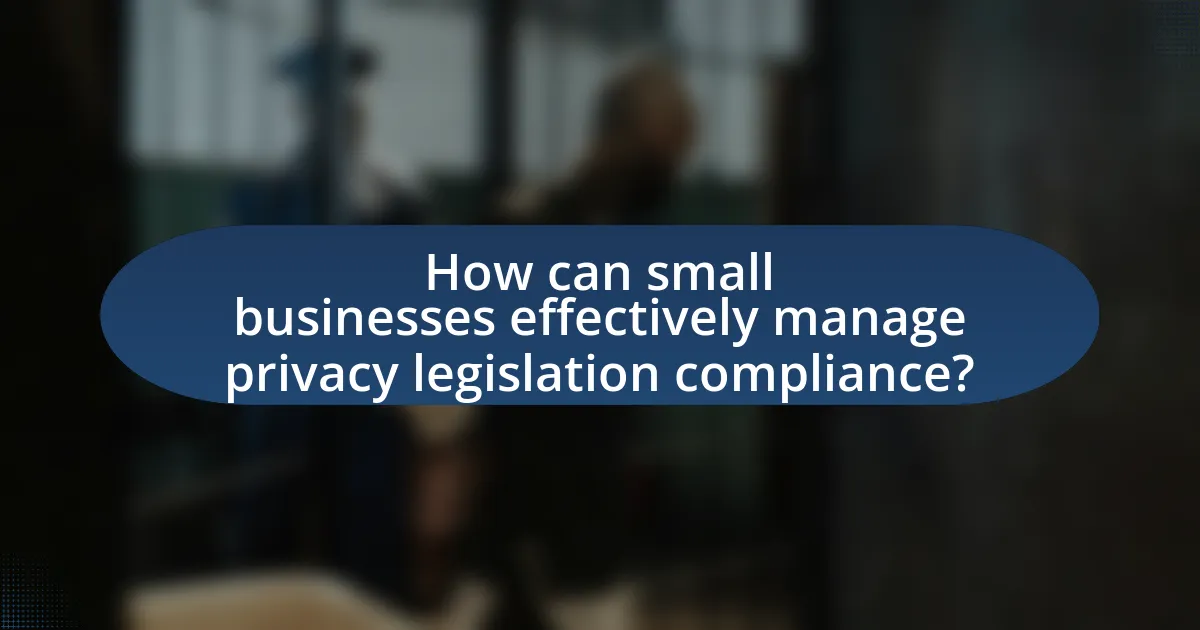
How can small businesses effectively manage privacy legislation compliance?
Small businesses can effectively manage privacy legislation compliance by implementing a comprehensive data protection strategy that includes regular audits, employee training, and clear privacy policies. Regular audits help identify areas of non-compliance and ensure adherence to regulations such as the General Data Protection Regulation (GDPR) and the California Consumer Privacy Act (CCPA). Employee training is crucial, as it equips staff with the knowledge to handle personal data responsibly and understand legal obligations. Clear privacy policies communicate how customer data is collected, used, and protected, fostering transparency and trust. According to a 2021 survey by the National Small Business Association, 60% of small businesses reported that they lack a formal privacy policy, highlighting the need for structured compliance efforts.
What strategies can small businesses implement for compliance?
Small businesses can implement several strategies for compliance with privacy legislation, including conducting regular audits, establishing clear data handling policies, and providing employee training. Regular audits help identify compliance gaps and ensure adherence to regulations such as the General Data Protection Regulation (GDPR) or the California Consumer Privacy Act (CCPA). Clear data handling policies outline how customer information is collected, stored, and used, which is essential for transparency and accountability. Employee training ensures that staff understand compliance requirements and the importance of protecting customer data, reducing the risk of breaches. According to a report by the Ponemon Institute, organizations that invest in employee training experience 50% fewer data breaches, highlighting the effectiveness of these strategies.
How can businesses conduct a privacy impact assessment?
Businesses can conduct a privacy impact assessment (PIA) by following a structured process that identifies and mitigates privacy risks associated with their projects or systems. This process typically involves defining the scope of the assessment, identifying the personal data involved, assessing the necessity and proportionality of data processing, evaluating risks to individuals’ privacy, and implementing measures to mitigate those risks.
For example, the Office of the Privacy Commissioner of Canada outlines that a PIA should include consultation with stakeholders, documentation of findings, and a plan for ongoing monitoring and review. This structured approach ensures compliance with privacy legislation and helps businesses protect personal data effectively.
What role does employee training play in compliance?
Employee training plays a crucial role in compliance by ensuring that employees understand and adhere to privacy legislation and organizational policies. Effective training programs equip employees with the knowledge of legal requirements, such as data protection laws, and the importance of safeguarding sensitive information. Research indicates that organizations with comprehensive training programs experience a 50% reduction in compliance violations, highlighting the direct impact of training on adherence to regulations. By fostering a culture of compliance through ongoing education, businesses can mitigate risks associated with non-compliance and enhance their overall operational integrity.
What tools and resources are available to assist small businesses?
Small businesses can utilize various tools and resources to assist them in navigating challenges, including compliance with privacy legislation. Key resources include government programs like the Small Business Administration (SBA), which offers funding, training, and advisory services. Additionally, software solutions such as compliance management tools help businesses adhere to regulations like the General Data Protection Regulation (GDPR) and the California Consumer Privacy Act (CCPA). According to the SBA, small businesses that engage with these resources are 50% more likely to succeed in their first five years compared to those that do not.
Which software solutions can help with data protection?
Software solutions that can help with data protection include encryption software, data loss prevention (DLP) tools, and backup solutions. Encryption software, such as VeraCrypt, secures sensitive data by converting it into unreadable code, ensuring that unauthorized users cannot access it. Data loss prevention tools, like Symantec DLP, monitor and control data transfers to prevent unauthorized sharing or leaks. Backup solutions, such as Acronis or Veeam, provide secure data storage and recovery options, protecting against data loss from breaches or system failures. These solutions are essential for small businesses to comply with privacy legislation and safeguard customer information.
What government resources are available for small business guidance?
The U.S. Small Business Administration (SBA) provides various resources for small business guidance, including free online courses, business plan templates, and access to local Small Business Development Centers (SBDCs). These resources are designed to help entrepreneurs navigate the complexities of starting and managing a business, particularly in relation to compliance with privacy legislation. Additionally, the SBA offers specific guidance on federal regulations that affect small businesses, ensuring that owners are informed about their legal obligations. The availability of these resources is supported by the SBA’s mission to assist small businesses in achieving their goals and fostering economic growth.
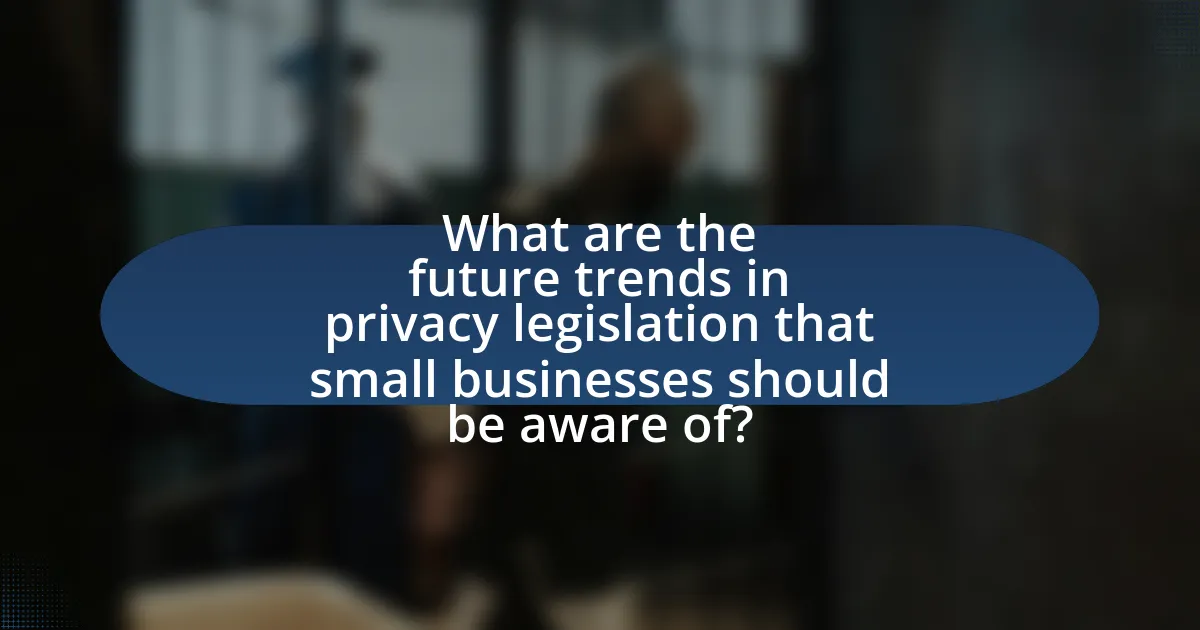
What are the future trends in privacy legislation that small businesses should be aware of?
Future trends in privacy legislation that small businesses should be aware of include the increasing adoption of comprehensive data protection laws similar to the General Data Protection Regulation (GDPR) in Europe, which emphasizes consumer rights and data transparency. As of 2023, several U.S. states, including California and Virginia, have enacted or are in the process of enacting their own privacy laws, reflecting a shift towards stricter regulations on data collection and usage. Additionally, there is a growing trend towards the regulation of artificial intelligence and automated decision-making processes, which will require small businesses to ensure compliance with ethical standards and transparency in their data practices. These trends indicate that small businesses must prioritize data privacy strategies and invest in compliance measures to avoid potential legal repercussions and maintain consumer trust.
How is technology influencing privacy legislation changes?
Technology is significantly influencing privacy legislation changes by driving the need for stronger data protection measures. The rapid advancement of digital technologies, such as artificial intelligence and big data analytics, has led to increased concerns about personal data misuse and privacy breaches. For instance, the implementation of the General Data Protection Regulation (GDPR) in the European Union was largely a response to the growing capabilities of technology to collect and process vast amounts of personal information. This regulation mandates stricter consent requirements and transparency obligations for businesses, reflecting the need to adapt legal frameworks to technological realities. Additionally, the rise of data breaches and high-profile scandals, such as the Cambridge Analytica incident, has prompted lawmakers worldwide to reconsider and update privacy laws to better protect individuals’ rights in the digital age.
What emerging technologies pose new privacy challenges?
Emerging technologies that pose new privacy challenges include artificial intelligence, the Internet of Things (IoT), and blockchain. Artificial intelligence systems can analyze vast amounts of personal data, leading to potential misuse or unauthorized access. The Internet of Things connects numerous devices that collect and transmit personal information, increasing the risk of data breaches. Blockchain, while offering secure transactions, can also inadvertently expose user data if not properly managed. These technologies create complex environments where personal privacy can be compromised, necessitating robust privacy legislation to protect individuals and small businesses.
How might future legislation impact small business operations?
Future legislation may significantly impact small business operations by imposing stricter compliance requirements regarding data privacy and protection. As governments increasingly prioritize consumer privacy, small businesses could face new regulations that mandate enhanced data security measures, transparency in data handling, and potential penalties for non-compliance. For instance, the implementation of the General Data Protection Regulation (GDPR) in Europe has already demonstrated how legislation can require businesses to invest in compliance infrastructure, affecting their operational costs and processes. Additionally, small businesses may need to allocate resources for employee training on data privacy practices, further influencing their operational dynamics.
What best practices should small businesses adopt for ongoing compliance?
Small businesses should adopt a proactive compliance strategy that includes regular training, data audits, and policy updates. Regular training ensures that employees are aware of privacy laws and best practices, which is crucial as non-compliance can lead to significant fines; for example, the General Data Protection Regulation (GDPR) can impose fines up to 4% of annual global turnover. Conducting data audits helps identify and rectify compliance gaps, while updating policies ensures alignment with evolving legislation. Additionally, maintaining clear documentation of compliance efforts can serve as evidence in case of audits or investigations, reinforcing the business’s commitment to adhering to privacy laws.
How can regular audits improve compliance efforts?
Regular audits enhance compliance efforts by systematically identifying gaps in adherence to privacy legislation and regulatory requirements. These audits provide a structured approach to evaluate current practices against established standards, ensuring that small businesses remain compliant with laws such as the General Data Protection Regulation (GDPR) and the California Consumer Privacy Act (CCPA). For instance, a study by the International Association of Privacy Professionals (IAPP) found that organizations conducting regular audits are 30% more likely to identify compliance issues before they escalate into significant violations. This proactive identification allows businesses to implement corrective measures promptly, reducing the risk of penalties and fostering a culture of accountability and transparency.
What proactive measures can businesses take to stay informed about legislative changes?
Businesses can stay informed about legislative changes by subscribing to legal and industry newsletters, attending relevant workshops and seminars, and engaging with professional associations. Subscribing to newsletters from legal firms or industry organizations provides timely updates on changes in legislation, while workshops and seminars offer insights from experts. Additionally, professional associations often have resources and networks that facilitate information sharing among members, ensuring that businesses remain aware of new laws and regulations that may impact their operations.
